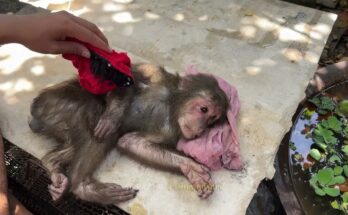In the dense green shadows of the Angkor Wat forest, life beats to the rhythm of the trees—wild, unpredictable, and heartbreakingly tender. That morning, it was unusually quiet. The sun filtered softly through the canopy. But something felt off.
We had come to check on a small troop of monkeys we’d been watching for weeks. That’s when we saw him—LYNX.
He was curled into the soft moss at the base of an old fig tree, his tiny chest barely rising. The other monkeys moved around him, playful and energetic as usual. But he was still. Too still.
At first, we thought he was simply napping—baby monkeys often crash after a long morning of climbing and foraging. But when his mother, a young and fiercely protective female named Liri, nudged him gently with her nose… and he didn’t stir… we knew something was wrong.
Liri tried again. A low, pleading sound came from her throat—half-whimper, half-warning. She licked his head, pulled at his tiny arm. Nothing. Just the slow rise and fall of a baby who looked more like he was floating between worlds than resting in one.
We’ve seen exhaustion before. But this was different.
LYNX wasn’t just tired. His tiny body was drained from the relentless struggle of survival.

There are moments in the wild when your heart wants to believe more than it fears. We told ourselves it was just a long nap—that the Cambodian heat had worn him out. But as the minutes passed, and the troop began to move on, Liri wouldn’t leave. She stayed. She sat beside him. She wrapped her body around his. Waiting. Hoping.
That image—of a mother refusing to let go—etched itself into our hearts.
It reminded us of something deeply human. Of holding your child in a hospital waiting room, of sleepless nights worrying about fevers and coughs, of whispering, “Please wake up” into a crib bathed in nightlight shadows.
It reminded us that love—real, raw love—doesn’t walk away, even when the world does.
A soft breeze stirred the branches overhead. LYNX gave the faintest twitch. His ear flicked. His paw shifted slightly in the leaves. Liri noticed it instantly. Her head shot up. She called softly again.
Then—miraculously—he opened one eye.
Weakly, slowly, LYNX lifted his head.
He didn’t sit up, didn’t leap, didn’t cling to her neck like usual. But he was there. Awake. Alive.
We had no words. Only quiet tears.
It would take hours before he stood again. He barely ate that day. But Liri carried him everywhere—on her back, her chest, tucked beneath her arm. She didn’t let go for a second.
In the days that followed, LYNX began to regain his strength. Tiny steps. Soft climbs. Little bites of fruit. And always—his mother watching, waiting, loving.
What happened to LYNX is something we may never fully understand. Was it a sickness? A moment of overwhelming fatigue? A brush with death?
Whatever it was, it showed us something the wild doesn’t often reveal so clearly: the strength of a mother’s heart. And the fragile, beautiful will to live in even the smallest of creatures.
As we walked back that evening, the forest felt different. Quieter. Still sacred. But somehow even more alive.
Not because of the drama or the fear—but because of the love.
Because of Liri, who never stopped believing in her baby.
Because of LYNX, who found just enough strength to stay.
And because in the heart of the jungle, a story of near loss became a story of quiet triumph.


